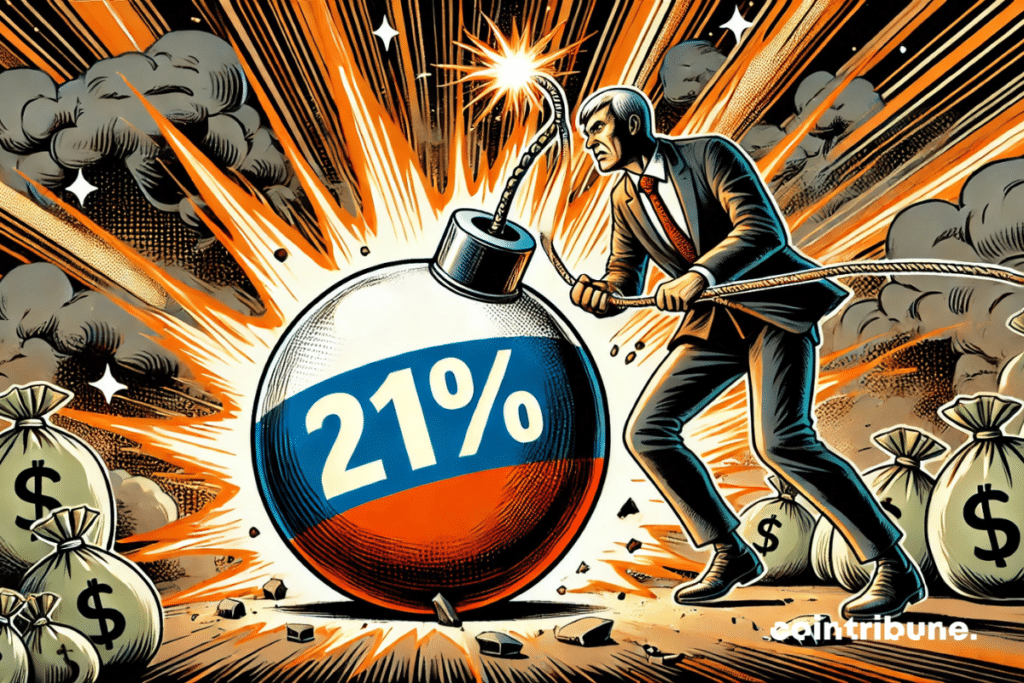Russia’s historic rate hike : Will it curb inflation or hurt the economy ?
Yesterday, Friday, the Russian central bank raised its key rate to 21 %, a historic level not seen since 2003. Behind this drastic decision lies an attempt to counter significant inflation, fueled by unprecedented military spending and an economy undergoing major changes due to international sanctions. For Moscow, the time is now to fight against the inflationary spiral, while Russian businesses and the market fear the repercussions of this monetary policy.

A monetary policy in response to uncontrolled inflation
The Russian central bank (CBR) announced this Friday, October 25, 2024, a brutal increase in its key rate from 19 % to 21 %, a record since 2003. This new tightening of monetary policy aims to « ensure the return of inflation to the target of 4 %,” explains the official CBR statement. With inflation at 8.63 % in September, well above expectations, this decision was anticipated by many observers, but its magnitude surprised many. For the record, the CBR had already increased its rate from 18% to 19% in September in an attempt to curb inflation, with no immediate success.
This rise in prices, largely fueled by massive public spending related to the war effort in Ukraine, continues to weigh on the Russian economy. Since 2021, federal spending has skyrocketed, with an increase of nearly 50 %, mainly to finance military expenditures. In 2025, the defense budget is expected to jump by another 30 %, reaching 13,500 billion rubles, or about 130 billion euros. The central bank directly points to these expenditures as a factor in persistent inflation, in a cycle that seems difficult to stop for now.
The economic repercussions and upcoming challenges
This sudden increase in the key rate raises serious concerns among business leaders in Russia. The high cost of bank loans, which has already been highlighted in recent weeks, is likely to weigh even more heavily on investments, particularly in sectors unrelated to the military industry. Many companies struggle to finance their projects, which thus slows economic growth. « The monetary tightening slows down investments and consumption,” confirm several business leaders in a report from the Rosstat agency.
Furthermore, the massive reorientation of the Russian economy towards the war effort is causing labor shortages in several key sectors. The mobilization of hundreds of thousands of men for the front, combined with the exodus of part of the population, limits the country’s production capacity. This explosive mix of inflation and labor shortages threatens to plunge Russia into a period of stagflation, where economic growth remains weak while prices continue to rise.
The decision of the Russian central bank to raise its key rate to 21 % is a risky bet. While it aims to curb inflation, it also risks strangling non-military sectors of the economy and slowing growth. The context remains marked by major uncertainties, notably the outcome of the conflict in Ukraine and the impact of Western sanctions. In the medium term, Russia could become even more dependent on its military expenditures, thus fueling a difficult-to-contain inflationary spiral. The country’s economic future looks bleak, with few signals of stabilization on the horizon. It would not be surprising if many Russian companies turned to solutions like investments in cryptos, especially Bitcoin.
Maximisez votre expérience Cointribune avec notre programme 'Read to Earn' ! Pour chaque article que vous lisez, gagnez des points et accédez à des récompenses exclusives. Inscrivez-vous dès maintenant et commencez à cumuler des avantages.
Diplômé de Sciences Po Toulouse et titulaire d'une certification consultant blockchain délivrée par Alyra, j'ai rejoint l'aventure Cointribune en 2019. Convaincu du potentiel de la blockchain pour transformer de nombreux secteurs de l'économie, j'ai pris l'engagement de sensibiliser et d'informer le grand public sur cet écosystème en constante évolution. Mon objectif est de permettre à chacun de mieux comprendre la blockchain et de saisir les opportunités qu'elle offre. Je m'efforce chaque jour de fournir une analyse objective de l'actualité, de décrypter les tendances du marché, de relayer les dernières innovations technologiques et de mettre en perspective les enjeux économiques et sociétaux de cette révolution en marche.
Les propos et opinions exprimés dans cet article n'engagent que leur auteur, et ne doivent pas être considérés comme des conseils en investissement. Effectuez vos propres recherches avant toute décision d'investissement.